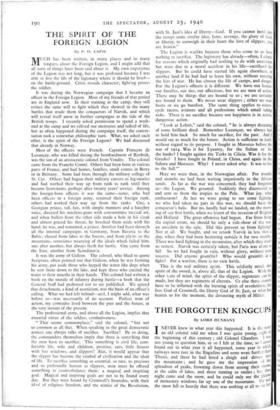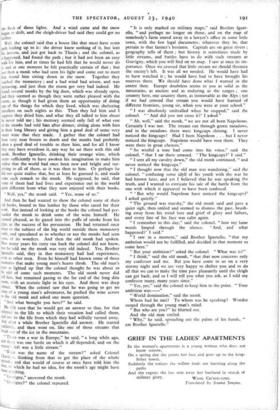THE FORGOTTEN KINGCUPS
By LORD DUNSANY
I NEVER knew in what year this happened. It is the story an old colonel told me when I was quite young, right at the beginning of this century ; old Colonel Charders. I was too young to question him, or so I felt at the time, so I never found out in what year it all happened, some year in which railways were rare in the Engadine and none went further than Thusis, and there he had hired a sleigh and driven into the mountains ; and he gave me the impression of the splendour of peaks, frowning down from among their sterols at the calm of lakes, and there turning to smiles ; but then night came and the snow, and he could only see the glenus of monastery windows far up one of the mountains. lie sa:a the snow fell so heavily that there was nothing at all to see bur the flash of those lights. And a wind came and the snow began to drift, and the sleigh-driver had said they could get no farther.
Well, the colonel said that a house like that must have some path leading up to it: the driver knew nothing of it, but lent his lantern, and just got back to Thusis ; and the colonel, as it happened, had found the path ; but it had not been an easy walk for him, and at times he had felt that he would never do it, and at one moment he felt practically certain of that ; but just then a monk who had seen his light and come out to meet him found him sitting down in the snow. Together they reached the monastery ; and a bad wind had arisen, and was increasing, and just then the storm got very bad indeed. He found several monks by the big door, which was already open, and they seemed as though they were rather pleased with the storm, as though it had given them an opportunity of doing one of the things for which they lived, which was sheltering travellers on such nights as this. Then they fed him and I suppose they dried him, and what they all talked to him about he never told me ; his memory seemed only full of what one of the monks had told him after dinner, sitting alone with him in their long library and giving him a good deal of some very sweet wine that they 'made. - I gather that the colonel had been very• near frozen to death and the monks had probably taken a good deal of trouble to thaw him, and for all I know they may have overdone it, any way he sat there with this old monk, Brother Ignetello, drinking their strange wine, which seems sufficiently to have awoken his imagination to make him realise that the world had once been new and bright and sur- prising to all of them, as it was then to him. Or perhaps he did not quite realise that, but at least he guessed it, and made some such remark to the monk. He supposed, he said, that some of them had had lives and experience out in the world quite different from what they now enjoyed with their books.
" Well, yes," the monk said. " Yes, some of us."
And then he had wanted to show the colonel some of their. old books, bound in fine leather by those who cared for their work. But instead of looking at the books the colonel had per- suaded the monk to drink some of the wine himself. He seemed pleased, as he gazed into the puffs of smoke from his pipe, at the success of his persuasion. He had returned once more to the subject of the big world outside those monastery walls, and speculated as to whether or not the monks had seen some of its wonders. And then the old monk had spoken. How many years his story ran back the colonel did not know, but he told me the monk was very old indeed. Yes, Brother Ignetello said, they in that monastery had had experiences, even as other men. Even he himself had known some of those moments that make young men's hearts throb. The old man's eyes so lighted up that the colonel thought he was about to be told of some such moments. The old monk never did tell him, but remained gazing to the far end of the long dim room, with an ecstatic light in his eyes. And there was deep silence. When the colonel saw that he was going to get no story of a young man's adventures, he pushed the wine across to the old monk and asked one more question.
"And what brought you here?" he said.
He felt sure that he would get an answer to that, for that referred to the life to which their vocation had called them, and not to the life from which they had wilfully turned away. And after a while Brother Ignetello did answer. He started suddenly, and then went on, like one of those streams that r break out of the ice in the mountains.
" There was a war in Europe," he said, " a long while ago, and there was one battle on which it all 'depended, and on the enemy's left was a little stream."
"What was the name of the stream?" asked Colonel Olarders, thinking from that to get the place of the whole ePisode- and that would of course at once have told him the date. of which he had no idea, for the monk's age might have been anything,
if
uravigny," answered the monk. " Gravigny?" the colonel repeated. " It is only marked on military maps," said Brother Ignet- ello, " and perhaps no longer on those, and on the map of somebody's farm stored away in a lawyer's office in some little town, with the few legal documents, whatever they be, that pertain to that farmer's business. Capitals are on great rivers ; geography tells of them ; but history is sometimes made by little streams, and battles have to do with such streams as Gravigny, which you will find on no map. I saw at once its im- portance. Once we crossed that little stream we should threaten the enemy's left. It was all we needed. He would have had to have watched it ; he would have had to have brought his reserves there. We should have done what I wanted in the centre then. Europe doubtless seems to you as solid as the mountains, as ancient and as enduring as the ranges ; one country here, one country there, as immovable as the Alps ; yet if we had crossed that stream you would have learned of different frontiers, young sir, when you were at your school."
" I was absolutely enthralled when he stopped," said the colonel. " And did you not cross it?' I asked."
" Ah, well," said the monk, " we are not all born Napoleons. Certainly I was not. The stream ran through green meadows, and in the meadows there were kingcups shining. I never -noticed the kingcups! Had I been Napoleon . . . but I never noticed the kingcups. Napoleon would have seen them. They were there in great clusters."
" So wistful a tone had come into his voice," said the colonel, " that I sat there amazed. ' The kingcups?' I said."
" I sent all my cavalry down," the old monk continued, " and never noticed the kingcups."
" I thought now that the old man was wandering," said the colonel, " confusing some idyll of his youth with the war he had known later, and yet I believed that he was speaking the truth, and I wanted to extricate his tale of the battle from the one with which it appeared to have been confused.
" ' But why would Napoleon have noticed the kingcups?' I asked quietly."
" The ground was marshy," the old monk said and gave a quiet sigh, then smiled and seemed to dismiss the past, brush- ing away from his mind lure and grief of glory and failure, and every line of his face was calm again.
" I remember to this day," said the colonel, " how my lame words limped through the silence. ' And, and what happened?' I said."
" I saw in a moment," said Brother Ignetello, " that my ambition would not be fulfilled, and decided in that moment to come here."
" But your ambition?" asked the colonel. " What was it?"
" I think," said the old monk, " that that now concerns only my confessor and me. But you have come to us on a very stormy night and we are very happy to shelter you and to do all that we can to make the time pass pleasantly until the sleigh can get back, and so I will tell you what you ask, as I told my confessor many, many years since."
" Yes, yes," said the colonel to keep him to the point. " Your ambition was-" " World domination," said the monk.
Whom had he met? To whom was he speaking? Wonder surged through the young man's mind.
" But who are you?" he blurted out.
And the old man smiled.
" Why," he said, spreading out the palms of his hands, " am Brother Ignetello."































 Previous page
Previous page